Collagen is a protein found in the body’s connective tissues, such as skin, bones, and tendons. It provides structural support, elasticity, and strength to these tissues. As we age, our body’s natural collagen production decreases, leading to wrinkles, sagging skin, and weaker bones.

Collagen-rich foods are those that contain the amino acids needed for collagen production. Some of the best dietary sources of collagen include bone broth, fish, chicken, and egg whites. These foods are not only rich in collagen, but also in other nutrients that are important for overall health.
Incorporating these foods into your diet can help support healthy skin, bones, and joints.
Key Takeaways
- Collagen is a protein that provides structural support, elasticity, and strength to the body’s connective tissues.
- Dietary sources of collagen include bone broth, fish, chicken, and egg whites.
- Incorporating collagen-rich foods into your diet can help support healthy skin, bones, and joints.
Understanding Collagen
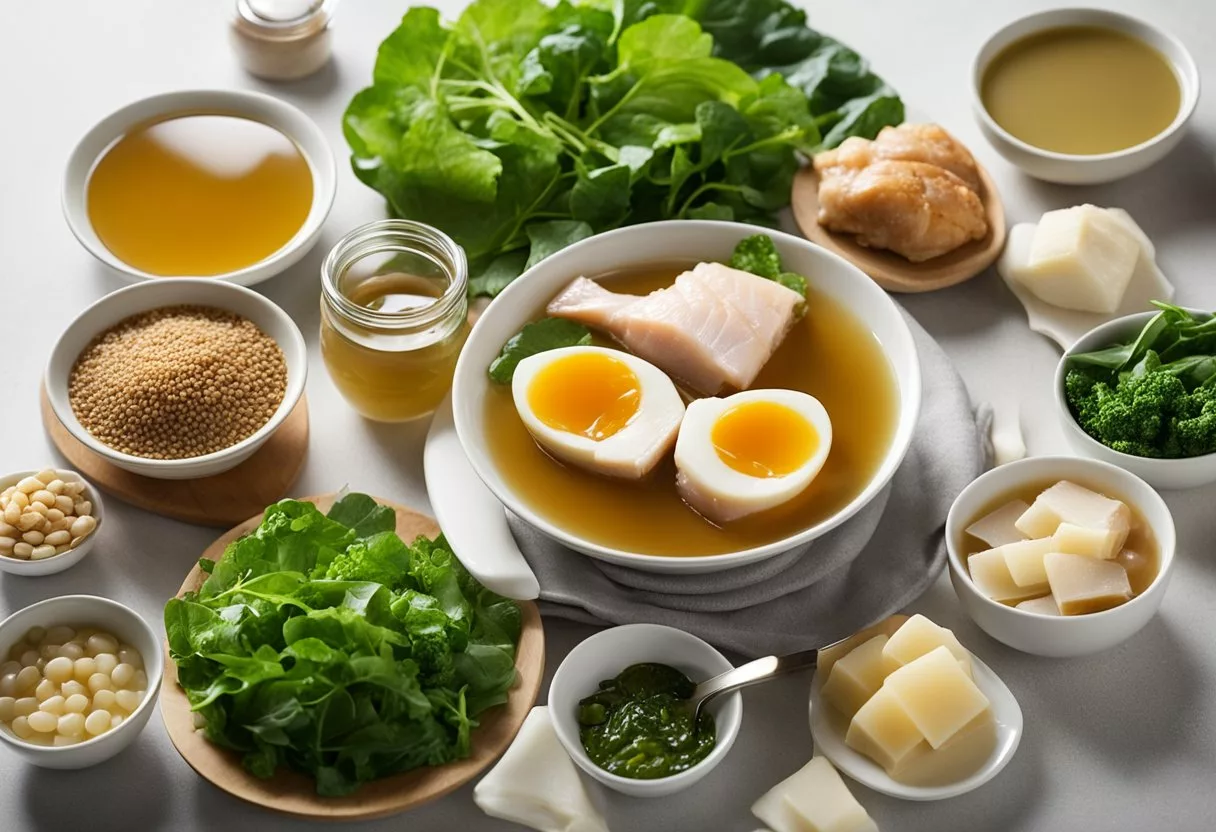
Collagen and Its Role in the Body
Collagen is a type of protein that is found in the body’s connective tissues, such as the skin, bones, and joints. It is the most abundant protein in the human body, making up about 30% of the total protein content. Collagen plays a crucial role in maintaining the structure and integrity of these tissues.
There are several types of collagen, each with a specific function in the body. For example, type I collagen is found in the skin, bones, and tendons, while type II collagen is found in the cartilage. Type III collagen is found in the blood vessels and internal organs.
The Importance of Amino Acids
Collagen is made up of amino acids, which are the building blocks of protein. The most important amino acids for collagen production are glycine, proline, and hydroxyproline.
These amino acids are essential for the synthesis of collagen, and they play a crucial role in maintaining the structure and function of the connective tissues.
The body can produce collagen on its own, but it needs a steady supply of amino acids to do so. Eating a diet rich in collagen and amino acid-containing foods can help support the body’s natural collagen production.
Collagen Degradation and Aging
As people age, their bodies produce less collagen, leading to a breakdown of the connective tissues. This can result in wrinkles, sagging skin, and joint pain. Factors that can accelerate collagen degradation include sun exposure, smoking, and a poor diet.
While it’s not possible to completely stop the aging process, there are steps people can take to slow down collagen degradation and maintain healthy connective tissues.
Eating a diet rich in collagen and amino acid-containing foods, such as bone broth, meats, and fish, can help support the body’s natural collagen production.
Dietary Sources of Collagen
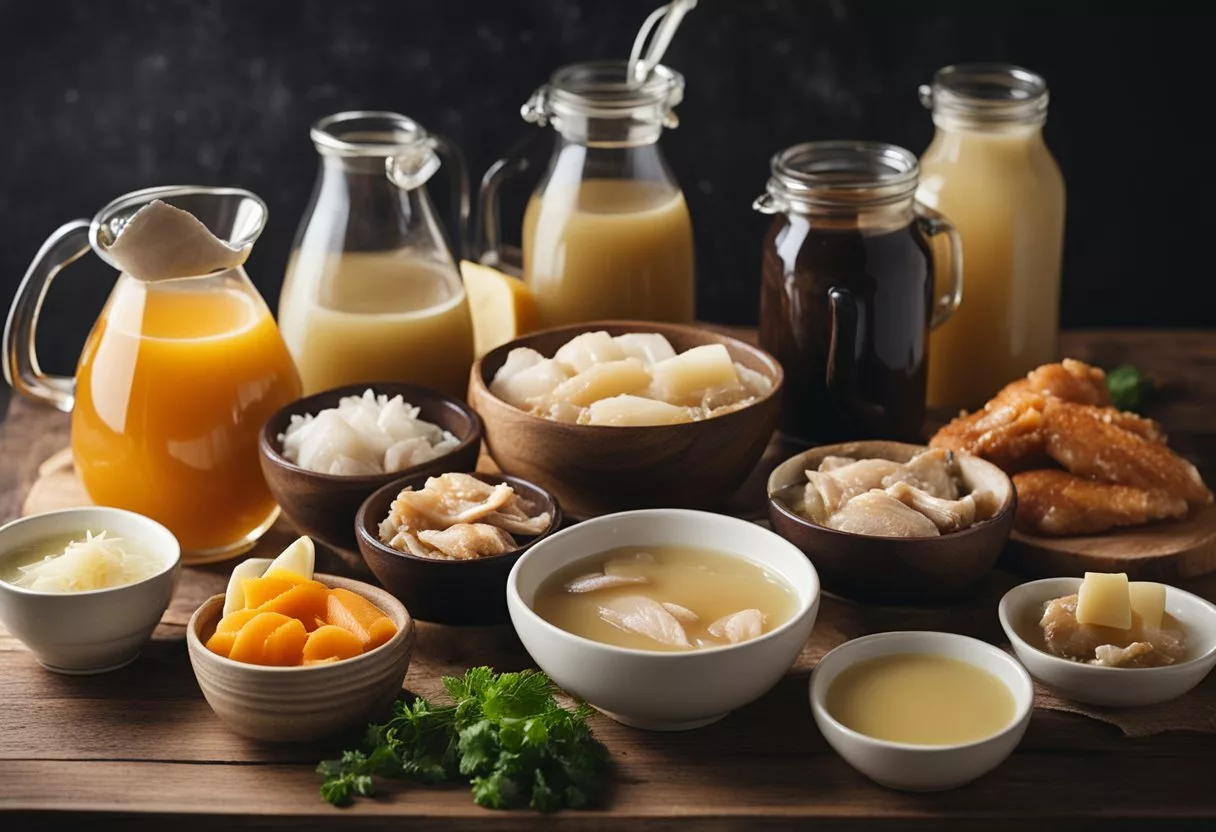
Collagen is a protein that is naturally produced by the body and is responsible for maintaining skin elasticity, joint health, and bone strength. However, as people age, collagen production naturally decreases. Therefore, it is important to consume foods that are rich in collagen or support its production.
Animal-Based Collagen Sources
Animal-based foods are the richest sources of collagen. Bone broth, made from simmering animal bones and connective tissue, is a popular source of collagen. Pork bone broth is a particularly rich source of collagen and closely resembles human collagen, making it ideal for skin, wound, and tendon repair and reinforcement. Chicken and beef bone broths are also good sources of collagen.
Meat products like beef and chicken are also rich in collagen. Collagen is found in the connective tissue of these animals, particularly in tougher cuts of meat like pot roast, brisket, and chuck steak. Fish, especially those with edible skin and bones, is another good source of collagen.
Egg whites are also a good source of collagen. While the yolk contains many essential nutrients, the egg white contains a high concentration of collagen.
Plant-Based Nutrients Supporting Collagen
While animal-based foods are the richest sources of collagen, plant-based foods can also help support collagen production.
Vitamin C is essential for collagen production and can be found in citrus fruits like oranges and grapefruits, as well as red and green peppers. Berries like strawberries, raspberries, and blueberries are also rich in vitamin C.
Leafy greens like spinach and kale are rich in antioxidants that help protect the body’s collagen from damage. Nuts like almonds and cashews are rich in copper, which is essential for collagen production. Legumes like beans and lentils are rich in protein, which the body needs to produce collagen.
Collagen-Rich Foods and Their Benefits
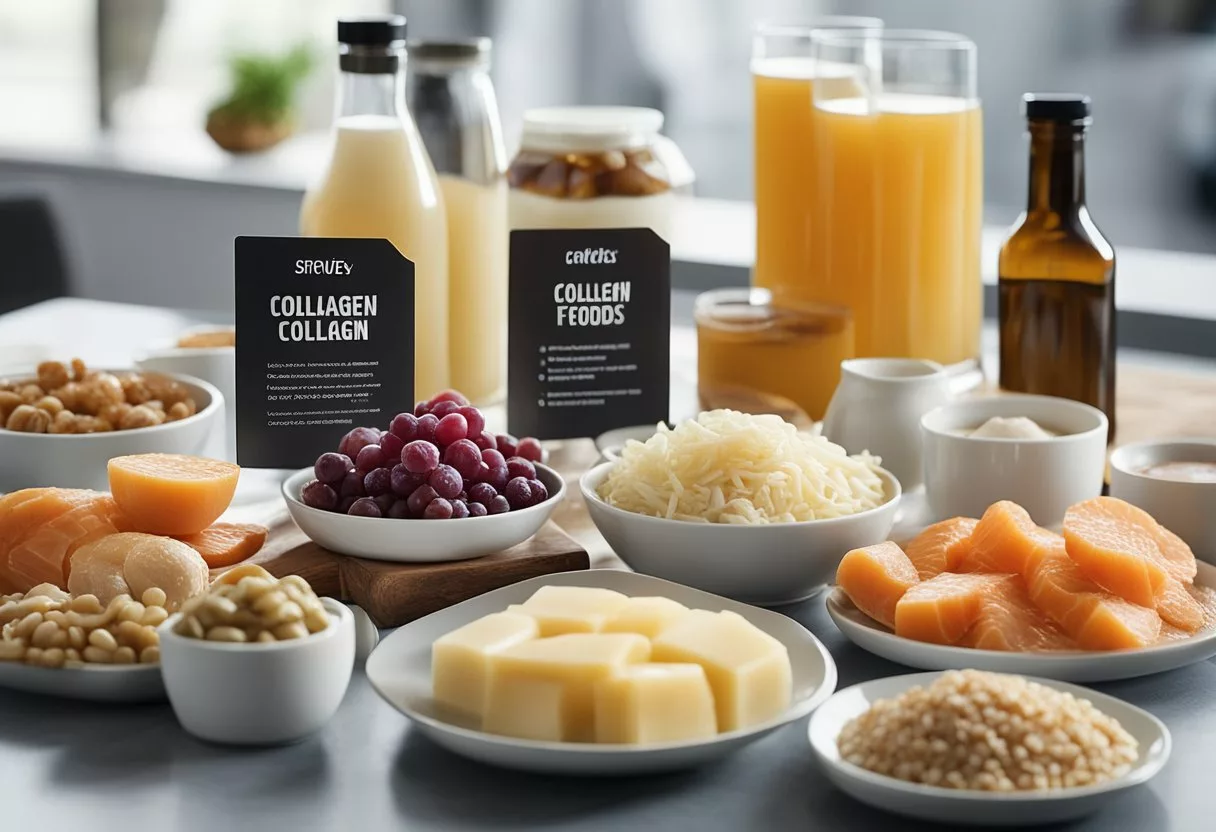
Collagen is a protein that is essential for healthy skin, hair, nails, and joints. While the body naturally produces collagen, its production decreases with age. Fortunately, there are many foods that can help boost collagen production. Here are some of the best collagen-rich foods and their benefits:
Meats and Fish High in Collagen
Meat and fish are some of the best sources of collagen. Bone broth, for example, is a popular source of collagen that is made by simmering animal bones for an extended period. Chicken cartilage is also a great source of collagen, and it can be found in chicken feet, necks, and backs. Salmon is another excellent source of collagen, as it contains high levels of omega-3 fatty acids and vitamin D, both of which are essential for healthy skin.
Vegetables and Fruits for Collagen Production
Vegetables and fruits are also great sources of collagen. Bell peppers, for example, are rich in vitamin C, which is essential for collagen production. Tomatoes are another great source of vitamin C, as well as lycopene, which can help protect the skin from UV damage.
Garlic is also beneficial for collagen production, as it contains sulfur compounds that can help boost collagen synthesis.
Citrus fruits, such as oranges and grapefruits, are also great sources of vitamin C. Berries, such as strawberries, blueberries, and raspberries, are also rich in antioxidants that can help protect the skin from oxidative stress. Nuts, such as almonds and walnuts, are also good sources of collagen, as they contain high levels of protein and healthy fats.
Other Foods Promoting Collagen Synthesis
In addition to meat, fish, vegetables, and fruits, there are many other foods that can help promote collagen synthesis. Oysters, for example, are rich in zinc, which is essential for collagen production. Beans, such as kidney beans and black beans, are also great sources of protein and can help support collagen synthesis.
Enhancing Collagen Absorption
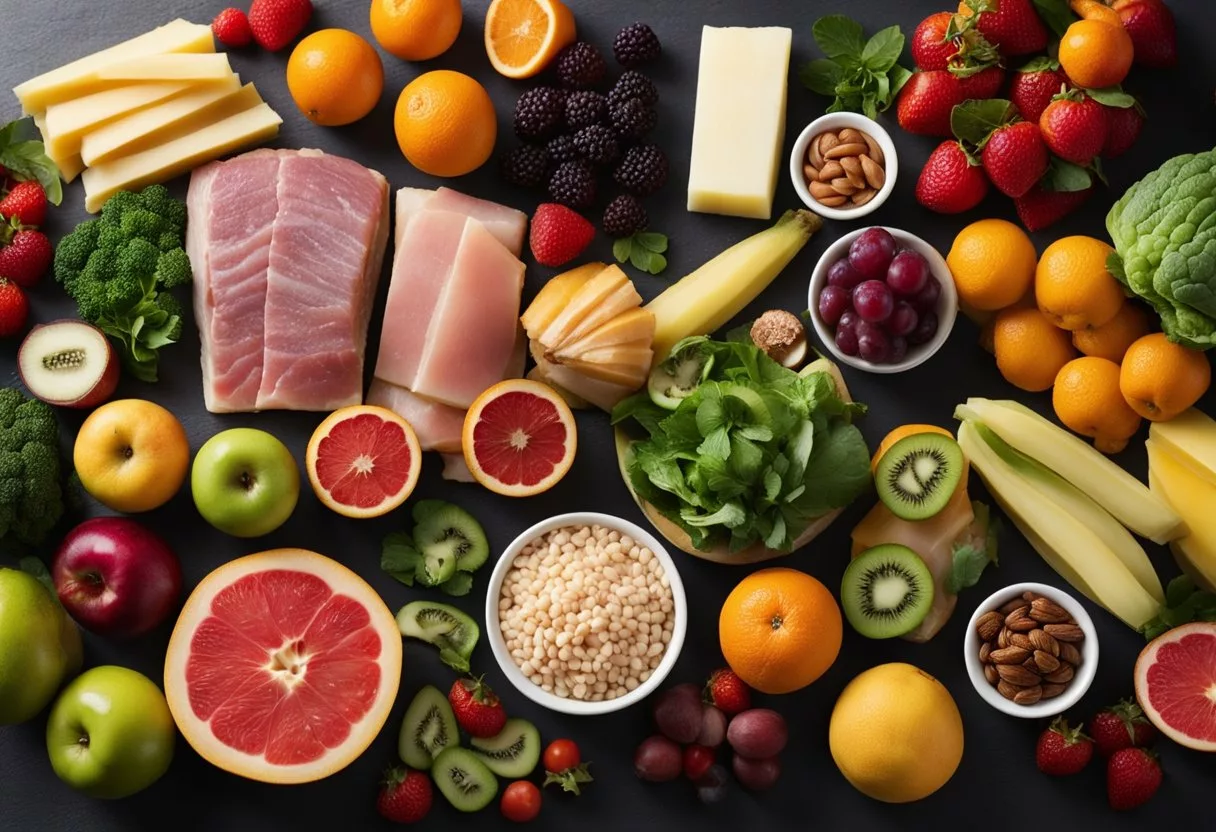
Role of Vitamin C and Other Nutrients
Consuming foods rich in vitamin C is essential for collagen synthesis. Vitamin C plays a crucial role in converting proline to hydroxyproline, a major component of collagen.
In addition to vitamin C, consuming foods rich in zinc, copper, sulfur, vitamin D, and iron can also aid in collagen absorption.
Zinc is involved in the synthesis of collagen, while copper is essential for the cross-linking of collagen fibers. Sulfur is required for the synthesis of collagen and helps to maintain the integrity of connective tissues. Vitamin D helps to regulate the production of collagen, while iron is involved in the formation of collagen fibers.
Avoiding Factors that Impede Collagen Absorption
In addition to consuming foods rich in collagen-boosting nutrients, it is also important to avoid factors that impede collagen absorption.
One such factor is added sugar. Consuming excessive amounts of added sugar can lead to the production of advanced glycation end products (AGEs), which can damage collagen fibers and impede collagen absorption.
Antioxidants can help to counteract the effects of AGEs and protect collagen fibers.
It is also important to note that collagen absorption can be impeded by certain medications, such as corticosteroids and nonsteroidal anti-inflammatory drugs (NSAIDs). These medications can interfere with collagen synthesis and lead to a decrease in collagen production.
Collagen Supplements and Alternatives
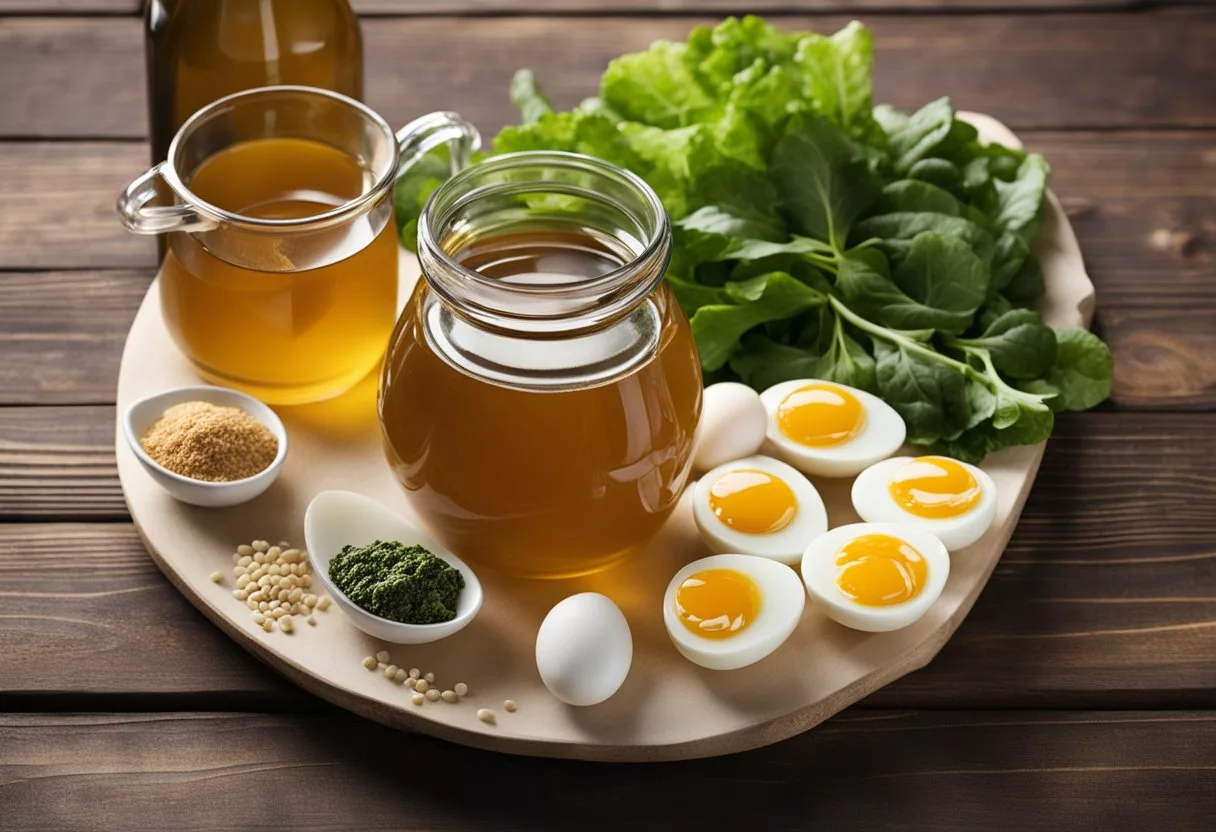
Types of Collagen Supplements
Collagen supplements are available in various forms, including pills, powders, and liquids. The most common types of collagen supplements are hydrolyzed collagen, marine collagen, and collagen peptides.
Hydrolyzed collagen is derived from bovine, porcine, or marine sources and is broken down into smaller peptides for better absorption. Meanwhile, marine collagen is derived from fish and is considered to be more easily absorbed by the body. Lastly, collagen peptides are a type of hydrolyzed collagen that are derived from bovine or marine sources and are broken down into smaller peptides.
Efficacy and Safety of Collagen Supplements
Some studies suggest that collagen supplements may improve skin elasticity, reduce wrinkles, and increase bone density, but the evidence is not conclusive. Since the FDA does not regulate collagen supplements, it is important to choose a reputable brand and follow the recommended dosage.
It is also important to note that collagen supplements may interact with certain medications and should not be used as a substitute for medical treatment.
In addition to collagen supplements, there are also natural alternatives that may help boost collagen production, such as consuming foods rich in vitamin C, copper, and zinc.
These include citrus fruits, leafy greens, nuts, and seeds. Incorporating these foods into a balanced diet may be a more sustainable way to support collagen production in the body.
Collagen’s Impact on Health and Wellness
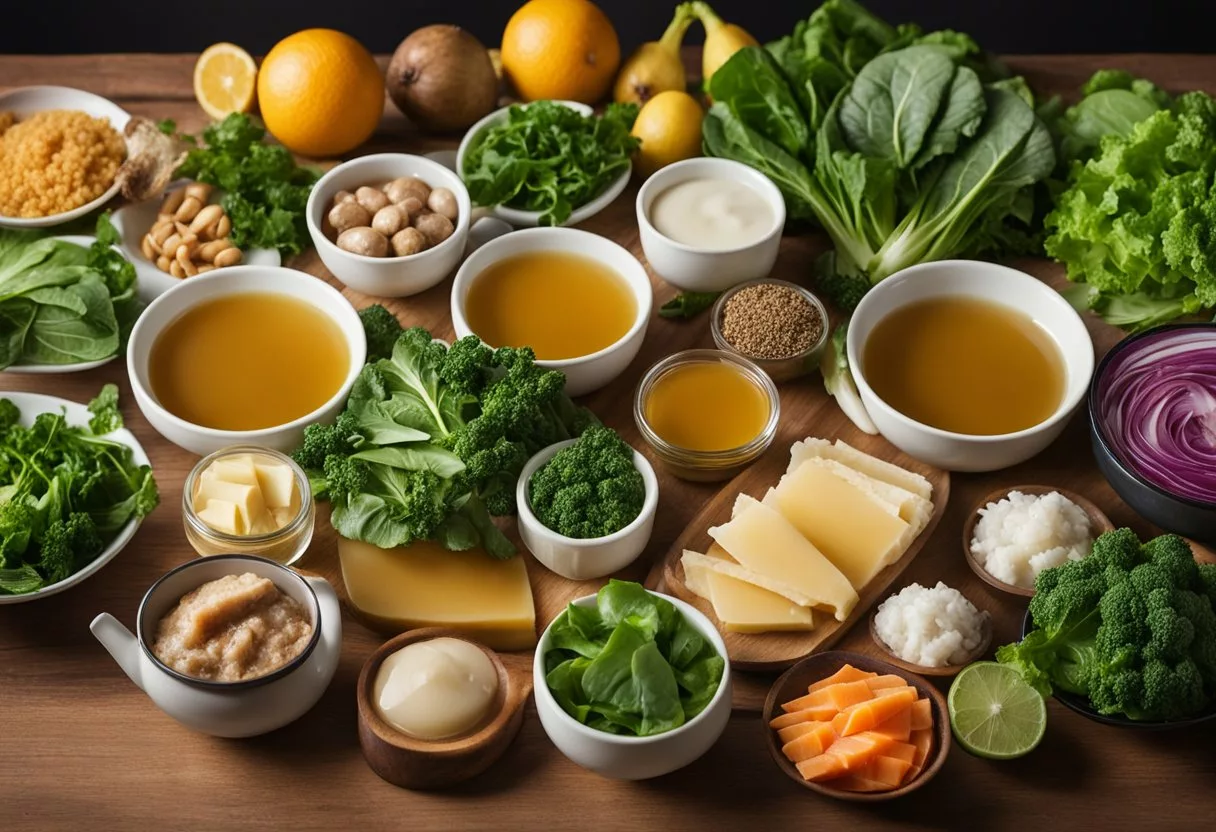
Collagen is a protein that plays a vital role in the health and wellness of the human body. It is the most abundant protein in the body, and it is found in many tissues, including the skin, bones, and joints. Collagen is responsible for providing strength and structure to these tissues, and it also helps them to function properly.
Collagen for Skin Health and Elasticity
Collagen is an essential component of the skin, and it plays a crucial role in maintaining its health and elasticity. As people age, their bodies produce less collagen, which can lead to the formation of wrinkles and a loss of skin elasticity. However, consuming collagen-rich foods can help to slow down this process and keep the skin looking youthful and healthy.
Collagen’s Role in Joint and Bone Strength
Collagen is also important for maintaining joint and bone health. It is a key component of cartilage, which is the tissue that cushions the joints and helps them to move smoothly. Collagen also helps to strengthen bones, making them less prone to fractures and other injuries.
As people age, their bodies produce less collagen, which can lead to joint pain and a loss of bone density. However, consuming collagen-rich foods can help to slow down this process and keep the joints and bones strong and healthy.
Collagen and Muscle Maintenance
Lastly, collagen is essential for maintaining muscle health. It is a key component of tendons and ligaments, which are the tissues that connect muscles to bones and help them to move. Collagen also helps to maintain muscle mass, making it easier to perform daily activities and exercise.
As people age, their bodies produce less collagen, which can lead to a loss of muscle mass and strength. However, consuming collagen-rich foods can help to slow down this process and keep the muscles healthy and strong.
Practical Tips for a Collagen-Rich Diet

Collagen is a crucial protein that helps maintain the health of our skin, joints, and bones. Incorporating collagen-rich foods into your diet can help increase your collagen intake and promote overall health. Here are some practical tips for incorporating collagen-rich foods into your meals.
Incorporating Collagen-Rich Foods into Meals
There are many ways to incorporate collagen-rich foods into your meals. Here are some ideas:
- Add bone broth to soups, stews, and sauces.
- Use skin-on chicken in recipes.
- Include nuts and seeds in your diet.
- Eat fish and shellfish, which are rich in collagen.
- Add collagen powder to smoothies, coffee, or tea.
Balancing Macronutrients and Collagen Intake
It’s important to balance your macronutrient intake (protein, carbohydrates, and fats) with your collagen intake. Here are some tips:
- Include collagen-rich foods in your meals, but don’t rely on them as your only source of protein.
- Eat a variety of protein-rich foods, such as chicken, fish, tofu, and beans.
- Pair collagen-rich foods with whole grains, vegetables, and healthy fats to create a balanced meal.
- Drink milk or eat dairy products, which contain both protein and collagen.
